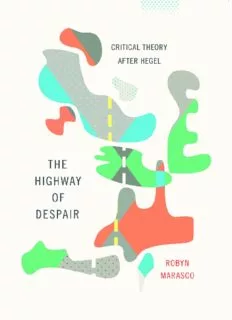Table Of ContentTHE HIGHWAY
OF DESPAIR
New Directions in Critical Theory
NEW DIRECTIONS IN CRITICAL THEORY
Amy Allen, General Editor
New Directions in Critical Theory presents outstanding classic and contem-
porary texts in the tradition of critical social theory, broadly construed. The
series aims to renew and advance the program of critical social theory, with
a particular focus on theorizing contemporary struggles around gender,
race, sexuality, class, and globalization and their complex interconnections.
Narrating Evil: A Postmetaphysical Theory of Reflective Judgment, María Pía Lara
The Politics of Our Selves: Power, Autonomy, and Gender in Contemporary
Critical Theory, Amy Allen
Democracy and the Political Unconscious, Noëlle McAfee
The Force of the Example: Explorations in the Paradigm of Judgment,
Alessandro Ferrara
Horrorism: Naming Contemporary Violence, Adriana Cavarero
Scales of Justice: Reimagining Political Space in a Globalizing World, Nancy Fraser
Pathologies of Reason: On the Legacy of Critical Theory, Axel Honneth
States Without Nations: Citizenship for Mortals, Jacqueline Stevens
The Racial Discourses of Life Philosophy: Négritude, Vitalism, and Modernity,
Donna V. Jones
Democracy in What State?, Giorgio Agamben, Alain Badiou, Daniel Bensaïd,
Wendy Brown, Jean-Luc Nancy, Jacques Rancière, Kristin Ross, Slavoj Žižek
Politics of Culture and the Spirit of Critique: Dialogues, edited by Gabriel Rockhill
and Alfredo Gomez-Muller
Mute Speech: Literature, Critical Theory, and Politics, Jacques Rancière
The Right to Justification: Elements of Constructivist Theory of Justice, Rainer Forst
The Scandal of Reason: A Critical Theory of Political Judgment, Albena Azmanova
The Wrath of Capital: Neoliberalism and Climate Change Politics, Adrian Parr
Media of Reason: A Theory of Rationality, Matthias Vogel
Social Acceleration: The Transformation of Time in Modernity, Hartmut Rosa
The Disclosure of Politics: Struggles Over the Semantics of Secularization,
María Pía Lara
Radical Cosmopolitics: The Ethics and Politics of Democratic Universalism,
James Ingram
Freedom’s Right: The Social Foundations of Democratic Life, Axel Honneth
Imaginal Politics: Images Beyond Imagination and the Imaginary, Chiara Bottici
Alienation, Rahel Jaeggi
The Power of Tolerance: A Debate, Wendy Brown and Rainer Forst, edited by
Luca Di Blasi and Christoph F. E. Holzhey
Radical History and the Politics of Art, Gabriel Rockhill
the
H IG H WAY
of
D E SPA I R
critical theory
after hegel
Robyn Marasco
Columbia University Press
New York
Columbia University Press
Publishers Since 1893
New York Chichester, West Sussex
cup.columbia.edu
Copyright © 2015 Columbia University Press
All rights reserved
Library of Congress Cataloging-in-Publication Data
Marasco, Robyn.
The highway of despair : critical theory after Hegel / Robyn Marasco.
pages cm. — (New directions in critical theory)
Includes bibliographical references and index.
isbn 978-0-231-16866-3 (cloth : alk. paper) —
isbn 978-0-231-53889-3 (e-book)
1. Criticism (Philosophy) 2. Critical theory.
3. Hegel, Georg Wilhelm Friedrich, 1770–1831.
4. Dialectic. 5. Despair. I. Title.
B809.3.M364 2015
190—dc23 2014014339
Columbia University Press books are printed on permanent
and durable acid-free paper.
This book is printed on paper with recycled content.
Printed in the United States of America
c 10 9 8 7 6 5 4 3 2 1
Jacket design by Jennifer Heuer
References to websites (URLs) were accurate at the time of writing. Neither the
author nor Columbia University Press is responsible for URLs that may have
expired or changed since the manuscript was prepared.
In loving memory of my father,
Robert F. Marasco
CONTENTS
Acknowledgments ix
Introduction 1
PART 1. DIALECTICS AND DESPAIR
1. Hegel, the Wound 25
2. Kierkegaard’s Diagnostics 58
PART 2. DIALECTICAL REMAINS
3. Theodor W. Adorno: Aporetics 81
4. Georges Bataille: Aleatory Dialectics 114
5. Frantz Fanon: Critique, with Knives 140
Concluding Postscript 169
Notes 185
Index 219
ACKNOWLEDGMENTS
I have had the privilege to study and teach at great institutions and
each has supported my scholarly work beyond measure. I was taught
how to do political theory by Wendy Brown and her mentorship
allowed me to believe that I might be suited to it. Wendy super-
vised my work, wrote letters on my behalf, gave essential commen-
tary on several drafts of this work, and responded to every single
email. Beyond that, she offered steady encouragement and guid-
ance, patience, and humanity. I am grateful to many other Berkeley
faculty—Judith Butler, Martin Jay, Victoria Kahn, and Paul Thomas—
for their feedback on my research. Many thanks, also, to the director
and fellows at the Townsend Center for the Humanities and to Jean
Day, the associate editor at Representations.
The intellectual and personal relationships that I formed in my
Berkeley years remain my most important and enduring. Sharon
Stanley read this manuscript in its entirety and offered astute sug-
gestions for revisions. Jimmy Klausen has been a steady and cher-
ished interlocutor. Beyond that, both Sharon and Jimmy have offered
that rare experience of friendship that confirms I am never alone.
My thinking has been shaped by many conversations with Yves
Winter, George Ciccariello-Maher, Abbey Ciccariello-Maher, Ivan
Asher, Simon Stow, Dean Mathiowetz, Bibi Obler, James Martel, Libby
Anker, Annika Thiem, Jack Jackson, Julie Cooper, Bob Taylor, Michael
Description:Hegel's "highway of despair," introduced in his Phenomenology of Spirit, represents the tortured path traveled by "natural consciousness" on its way to freedom. Despair, the passionate residue of Hegelian critique, also indicates fugitive opportunities for freedom and preserves the principle of hope

